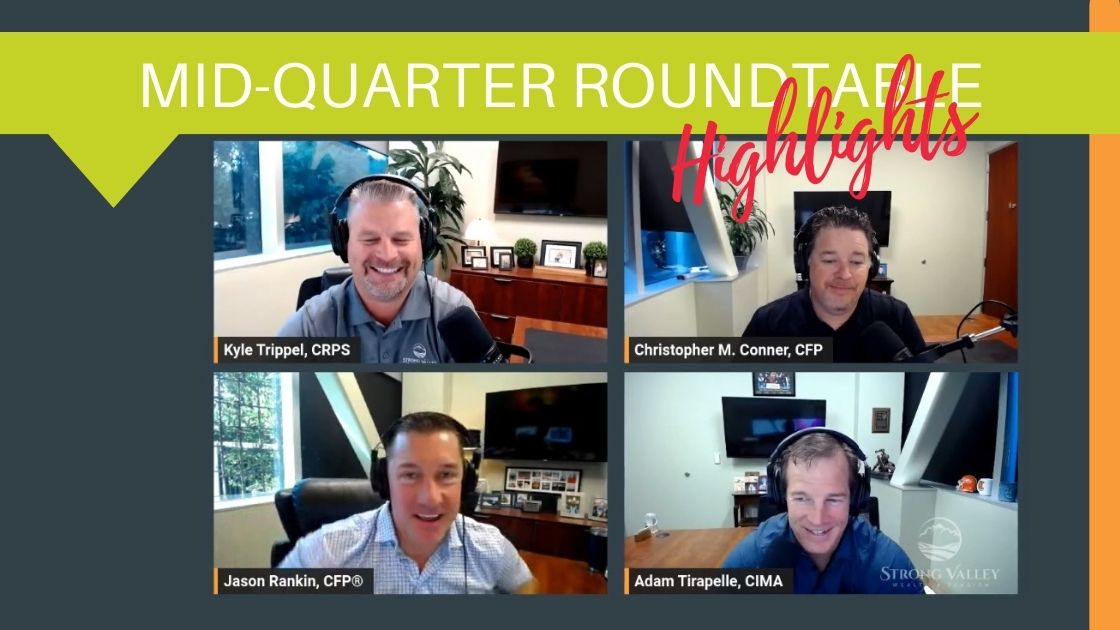You are now leaving the Strong Valley Wealth & Pension, LLC ("Strong Valley") website. By clicking on the "Schwab Alliance Access" link below you will be entering the Charles Schwab & Co., Inc. (“Schwab”) Website. Schwab is a registered broker-dealer, and is not affiliated with Strong Valley or any advisor(s) whose name(s) appears on this Website. Strong Valley is/are independently owned and operated. Schwab neither endorses nor recommends Strong Valley. Regardless of any referral or recommendation, Schwab does not endorse or recommend the investment strategy of any advisor. Schwab has agreements with Strong Valley under which Schwab provides Strong Valley with services related to your account. Schwab does not review the Strong Valley website(s), and makes no representation regarding the content of the Website(s). The information contained in the Strong Valley website should not be considered to be either a recommendation by Schwab or a solicitation of any offer to purchase or sell any securities.

Among the many things a financial advisor can help seasoned business executives with is understanding the risk of over-concentration in an investment portfolio. Resisting the allure of focusing a portfolio with stock from one’s own company is difficult without a thorough portfolio assessment and partnering with a professional to develop strategies to mitigate risk.

For seasoned business executives, the allure of company stock can be undeniable. After years of dedication and hard work, owning a significant portion of one's company can seem like a well-deserved reward. However, over-concentration in company stock poses risks that can jeopardize an executive's financial security and long-term prosperity.
Over-concentration occurs when a substantial portion of an individual's investment portfolio is allocated to a single asset or asset class, such as company stock. While loyalty and confidence in one's employer are admirable traits, relying too heavily on company stock exposes executives to heightened levels of risk, including:
Market Volatility: Company stock prices can be subject to significant fluctuations driven by market dynamics, industry trends, and company-specific factors. A downturn in the stock market or adverse developments within the company can lead to substantial declines in the value of the executive's holdings, eroding wealth and financial stability.
Diversification Risk: Over-concentration in company stock limits diversification opportunities within the executive's investment portfolio. Without adequate diversification across asset classes and sectors, executives are vulnerable to the idiosyncratic risks associated with the company's performance, increasing the potential for loss during periods of market turbulence.
Liquidity Constraints: Selling large blocks of company stock may be challenging due to limited market liquidity or regulatory restrictions. Executives may encounter difficulty liquidating their holdings to meet financial obligations or capitalize on investment opportunities, exacerbating liquidity constraints and hindering financial flexibility.
Company-Specific Risks: Holding a significant stake in one's employer exposes executives to company-specific risks, including operational challenges, management changes, regulatory issues, and competitive pressures. Adverse developments within the company can have a direct and disproportionate impact on the executive's financial well-being, underscoring the importance of risk mitigation strategies.
Financial advisors serve as trusted partners and advocates for seasoned business executives, offering expertise, perspective, and strategic guidance to navigate the complexities of wealth management and risk mitigation. Here's how financial advisors can help executives mitigate the risks of over-concentration in company stock:
Comprehensive Portfolio Analysis: A financial advisor conducts a thorough assessment of the executive's investment portfolio, including the allocation, concentration, and risk profile of company stock holdings.
By analyzing the composition of the portfolio and identifying areas of over-concentration, advisors gain insights into the executive's risk exposure and develop tailored strategies to mitigate risk.
Diversification Strategies: Financial advisors advocate for diversification as a cornerstone of sound investment management. By diversifying the executive's portfolio across multiple asset classes, industries, and geographic regions, advisors reduce reliance on any single investment and mitigate the impact of adverse market events or company-specific risks. Diversification strategies may involve reallocating assets, incorporating new investment opportunities, or implementing risk-mitigating instruments such as options or derivatives.
Tax-Efficient Asset Allocation: Executives with a significant stake in company stock may face complex tax considerations when rebalancing their investment portfolios. Financial advisors develop tax-efficient asset allocation strategies that minimize capital gains taxes and optimize after-tax returns while maintaining diversification and risk management objectives.
Liquidity Planning and Cash Flow Management: Financial advisors assist executives in developing liquidity planning strategies to address short-term cash flow needs and capital requirements. By establishing emergency funds, exploring alternative liquidity options, and coordinating cash flow management strategies, advisors ensure that executives maintain financial flexibility and resilience in the face of unforeseen circumstances.
Continuous Monitoring and Rebalancing: The financial landscape is dynamic, requiring ongoing monitoring and adjustment of investment portfolios to adapt to changing market conditions and risk factors. Financial advisors conduct regular portfolio reviews, rebalancing asset allocations, and realigning investment strategies to reflect the executive's evolving financial goals, risk tolerance, and market outlook.
Over-concentration in company stock presents significant risks that seasoned business executives must address proactively to safeguard their financial well-being and long-term prosperity. By partnering with a knowledgeable financial advisor, executives can implement prudent risk management strategies, diversify their investment portfolios, and navigate the complexities of wealth management with confidence and resilience.
Through strategic collaboration and disciplined execution, executives can mitigate the risks of over-concentration and work towards their financial goals with clarity, foresight, and peace of mind.



